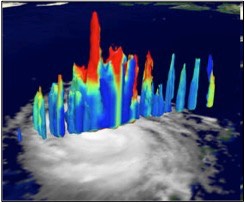Deep Convection, Tropical Meteorology, & Tropical Cyclones
Tropical meteorology is important for global weather and climate because most rainfall and therefore most energy transfers on Earth take place in low latitudes. It is also the birthplace of hurricanes and typhoons, which remain a challenge to understand as well as forecast.
The Lead Researchers and Their Work
Professor Zhaoxia Pu's recent research efforts have included high-resolution numerical simulations of tropical cyclones with the assimilation of satellite, radar, and in-situ observations with specific interests in 1) improving hurricane vortex initialization in numerical weather models, and 2) understanding the dynamic and physical processes that control tropical cyclone formation and rapid intensification. She has been involved with the NOAA “Hurricane Forecasting Improvement Program (HFIP)” in recent years. She also involves an internationally collaborative research program to study the tropical convection over the Maritime Continent region and their interaction with Madden-Julian Oscillation (MJO).”
 Professor Ed Zipser (RETIRED) and students in The Deep Convection and Tropical Cyclones Research Group study geographical variability in tropical precipitation such as the stark contrasts
between land and ocean storms and the processes that cause this variability. The group
also research tropical cyclones, specifically processes that differentiate between
intensifying and non-intensifying tropical cyclones through usage of aircraft data
from field campaigns, satellite retrievals of cloud and precipitation properties,
and modeling. Dr. Zipser and his students have participated in tropical field experiments
in northern Australia, the tropical western and central Pacific, Central America,
the Caribbean, the Atlantic Intertropical Convergence Zone, and West Africa.
Professor Ed Zipser (RETIRED) and students in The Deep Convection and Tropical Cyclones Research Group study geographical variability in tropical precipitation such as the stark contrasts
between land and ocean storms and the processes that cause this variability. The group
also research tropical cyclones, specifically processes that differentiate between
intensifying and non-intensifying tropical cyclones through usage of aircraft data
from field campaigns, satellite retrievals of cloud and precipitation properties,
and modeling. Dr. Zipser and his students have participated in tropical field experiments
in northern Australia, the tropical western and central Pacific, Central America,
the Caribbean, the Atlantic Intertropical Convergence Zone, and West Africa.

